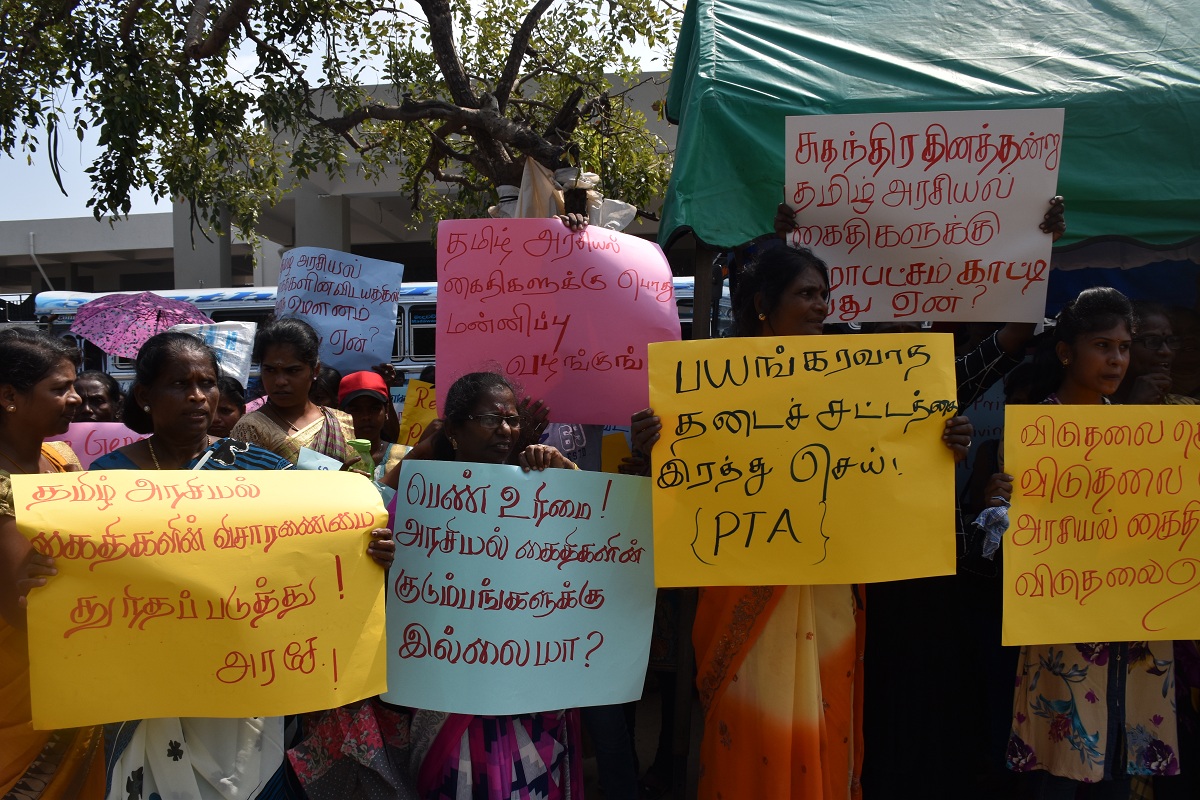Tamil women protest against the use of the PTA in 2020.
Representatives from the USA, European Union, Canada and international human rights organisations have expressed their concern and censured the Sri Lankan government over its use of anti-terror legislation to detain three Sinhalese student leaders this week.
The activists were all arrested last week and are currently being held under the draconian Prevention of Terrorism Act (PTA), a piece of legislation that has come under criticism for decades for its arbitrary use against Tamils.
"Using laws that don't conform with international human rights standards – like the PTA – erodes democracy in Sri Lanka," said US ambassador to Sri Lanka Julie Chung.
Using laws that don’t conform with international human rights standards – like the PTA – erodes democracy in Sri Lanka. We encourage the government to uphold the rights of the people to express their views.
— Ambassador Julie Chung (@USAmbSL) August 22, 2022
"We encourage the government to uphold the rights of the people to express their views," she tweeted.
The three protestors are Convenor of the Inter University Students’ Federation (IUSF) Wasantha Mudalige, Convener of Inter University Bhikku Federation Galwewa Siridhamma Thero, and member of the Kelaniya University Students’ Union Hashantha Jawantha Gunathilake.
UN Special Rapporteur on Human Rights Defenders Mary Lawlor said she was “deeply concerned” over the incident and that if Sri Lankan president signed their detention it would be a “dark day”.
I'm deeply concerned that Human Rights Defenders Wasantha Mudalige, Hashan Jeevantha & Galwewa Siridamma Himi have been arrested under the #SriLanka's Prevention of Terrorism Act. I call on President Ranil not to sign their detention order, doing so would be a dark day for .
— Mary Lawlor UN Special Rapporteur HRDs (@MaryLawlorhrds) August 21, 2022
The European Union said it was "concerned" by the development, and claimed that there was “information given by the [Sri Lankan government] to the International Community about the de-facto moratorium of the use of [PTA]”.
Concerned about reports on the use of the Prevention of Terrorism Act in recent arrests as we refer to information given by #GoSL to the International Community about the de-facto moratorium of the use of #PTA
— EU in Sri Lanka (@EU_in_Sri_Lanka) August 22, 2022
Canadian ambassador to Sri Lanka David McKinnon tweeted that the PTA “is widely seen as inconsistent with democratic norms and respect for human rights”.
We encourage authorities in #SriLanka to reconsider the decision to use the Prevention of Terrorism Act given the #PTA is widely seen as inconsistent with democratic norms and respect for human rights. https://t.co/m2ePdpikqX
— David McKinnon (@McKinnonDavid) August 22, 2022
Meanwhile human rights organisations such as Amnesty International and the International Commission of Jurists (ICJ).
“This weaponizing of an already highly-criticized law, which should be repealed immediately, is a testament to how the authorities are unwilling to withstand any form of criticism and are systematically stifling dissenting voices,” said Yamini Mishra, Amnesty International’s South Asia Director. “This is against Sri Lanka’s international human rights obligations, especially the rights to freedom of expression and peaceful assembly.”
“The PTA has a long history of abuse in Sri Lanka, and this development shows precisely why both local and international actors have been calling for its repeal. Time and time again, the Act has been used as a tool to silence government critics, journalists and minorities.”
The legislation has been used for over 40 years to enable prolonged arbitrary detention, granting the security services wide powers of arrest. The island’s Tamils have been disproportionately targeted by the PTA and for years have called for it to be repealed entirely.

